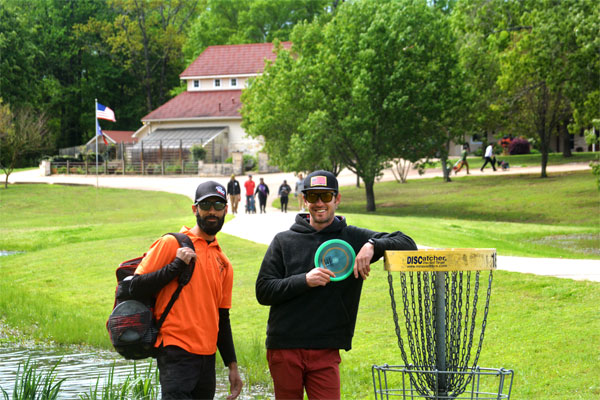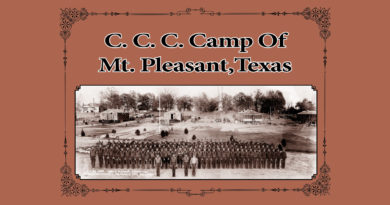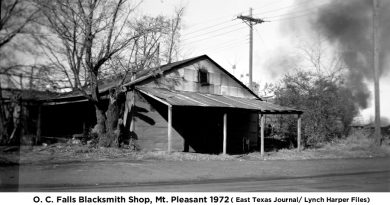Mt. Vernon Lands Regional Rail Facility for the Blacklands Line

MT. VERNON – Railroad and industrial barons packed the room. Coming up to bat with the game on the line, Lowe’s Distribution Center High Command Tracey Reed blasted a shot to the fence for the NETEX Rail District.
That meeting was last fall. By year’s end there’s going to be a “transload” facility connecting 18 wheelers on I-30 to rail traffic on a once-abandoned remnant of the Old Cotton Belt line. In a story years in the making, Lowe’s Franklin County Regional Distribution Center was the game changer.
Located between Lowe’s and the railroad on the Mt. Pleasant end of the Blacklands line running west to Greenville, the new transload facility will provide local service for industries presently trucking products to and from rail drops in Dallas, Houston and Shreveport.
A regional play rooted in Franklin County, leap back to 1994 when Mt. Vernon and Mt. Pleasant were competing for the Lowe’s facility. After a spirited behind the scenes competition, when the company passed on the Titus County recruitment package, Franklin County was suddenly on the list of three finalists to land a multi-million dollar newcomer promising jobs and new tax base.
After missing the cut, Mt. Pleasant’s Economic Development Corporation wrote a $1.5 million check to Mt. Vernon which passed it on to Lowe’s in an agreement landing a promise of 400 new jobs.
Fast forward 23 years. That’s turned into 1,000 jobs, added millions to the Franklin County tax base, pumped millions in payroll through half a dozen counties and with a nudge from Lowe’s management inked a contract to build a new transload facility on a once-abandoned rail line. Moving up from the minors, the short-line Blacklands railroad suddenly has new appeal in major-league shipping.
One of 603 “short line” railroads, the Blacklands connects Union Pacific and Kansas City Southern, Class 1 rail giants.
A Class 3 line operating at a maximum speed of 10 miles an hour, Blacklands’ bright red and yellow locomotives got into the game with the arrival of Wayne Defebaugh in 1999. The rail is leased from NETEX Rail District.
The NETEX rail district began as a one-man show going back to the mid 1990’s when former Franklin County Judge Paul Lovier was the only player in the game.
By the time he discovered plans to abandon the line between Mt. Pleasant and Wylie, the process was well underway.
“To stop it, I had to find some way to make an offer to buy the track,” he said. Finding government code providing for creation of a rail district provided he could enlist an adjacent county, the pitched his idea to the Titus County Commissioner’s Court.
“They agreed to sign up provided it didn’t cost anything,’ Mr. Lovier said.
Their first victory was modest.
“We talked the Franklin County economic development people into paying for us to hook up a phone,” he said. Hat in hand, he dialed up legal experts, the Washington firm of Wolf and Donley and was mildly shocked when they agreed to help.
“They thought we had a shot at making a deal,” he said. Lobbying his state rep, he found $3.2 million in Austin to buy the segment of track between Greenville and Sulphur Springs. Hunt and Hopkins County came aboard.
“Money,” Mr. Lovier noted, “has a way of changing things. We had an entourage when we went to Austin to pick up the check.”
They cut a deal with a first rail operator who went belly up within a year. The following year, they found Mr. Defebaugh, a regional sales manager with a Midwestern steel company. But he had railroad experience.
“My dad was a railroad conductor,” he said.
Cashing in his retirement and coming to Texas, he leased an abandoned Sulphur Springs gas station as headquarters for his railroad and hired a consultant to teach him how to drive a train.
By then, the line had been idle for more than a year. Former customers had worked out new shipping arrangements. In his first year, his railroad handled fewer than 500 cars. By 2009, he was moving 5,000 annually.
Anchored since inception by Mt. Vernon leadership, representatives from Titus, Franklin, Delta, Hunt and Hopkins counties serve on the board now chaired by Franklin County Commissioner Sam Young.
“Most of the business is on the west end of the line,” Mr. Young said. Two years ago, he first approached Lowe’s Distribution Center Manager Tracey Reed with his idea of locating a transload facility on the eastern end of the line in Franklin County. Her facility handles 76 million cubic feet of product a year – the equivalent of 32,000 18-wheeler loads.

What costs 24 cents to bring in by rail costs $1.11 to deliver on a truck, says researchgate.net.
“Sam had a good idea,” she said. “It’s a no brainer. The longer you can keep shipments on a train, the better.”
Lowe’s has 7,000 stores in the states and another 50 in Canada. The distribution center in Franklin county is one of 16 in the system.
Mrs. Reed wrote a long email, sent Mr. Young’s rail idea up the Lowe’s line to Mark Ramsey, the home-office Director of Transportation Strategy. She’d seen him a couple of times at meetings. He wrote back that there were a lot of unknowns.
Backed by Mr. Young’s board, NETEX part-time executive director Phil Davila used an Arkla-Tex Council of Governments (ATCOG) study of the potential for developing rail customers within a 100-mile radius of Texarkana as a pattern for a regional study anchored by service on the Blacklands, identifying 100’s of potential customers.
Mrs. Reed kept the home office updated on the project.
Given the volume of product moving through her facility, Mr. Young envisioned Lowe’s as the anchor account that would make the transload facility viable.
Here’s the deal – what’s a big deal for a short-line railroad running a stately 10 mph through a handful of rural Texas counties isn’t as proportionately large in a home office handling bi-coastal shipping logistics.
The railroad’s prime Class 1 connection likewise gave the thought a hearty ho-hum.
Two years into the idea, Mr. Young had yet to get Union Pacific to the table when he called Mrs. Reed in August. Union Pacific is the primary Class 1 railroad serving the Blacklands.
It was the first time she’d heard the rail district chairman frustrated, airing out problems without good answers.
“He hit a nerve,” she said. “I’m a fixer.”
And lawsey be, as the fourth largest importer in the states, Lowe’s has got the kind of stroke putting it on a Class 1 railroad’s radar even if the Blacklands doesn’t.
She honed her pitch to the home office. Starting with retail competition from Amazon’s cyberspace store, 7,000 brick and mortar storefronts closed last year, a record eclipsing closings in 2008’s Great Recession.
Battling a new front in cyberspace retailing, it’s a critical moment for traditional retail. The ranks of long-haul truckers are thinning, generating an upward trend in challenges for shipping and receiving.
“We’re never going to get a chance to see if it could work if they can’t get Union Pacific to the table,” she argued.

Mr. Ramsey made the call from Lowe’s. Union Pacific answered. The meeting was set.
Regional industries from towns on the Blacklands came armed with numbers.
Sensing the railroad’s decision hanging in the balance, at a pregnant pause in the discussion Mr. Ramsey pointed out that Lowe’s has the option of negotiating with Kansas City Southern, rerouting business to a second Class 1 line connecting to the Blacklands.
Cutting that short, the Union Pacific rep began earnestly gathering information to present to his home office in Omaha.
A decade ago, a home-grown and Gilmer-based trucking company was among the first to recognize the potential of the Blacklands.
“It was our best shot to put together the best shipping deal we could make for Ozarka,” said David Stevenson, founder and chairman of Gilmer’s Custom Commodities Transport. The company’s fleets operate in 48 states and Canada.
Mr. Stevenson worked out a deal with the Blacklands to cut the cost of shipping for Ozarka’s spring water bottling operations in Wood County. He was the first to begin a local discussion of the railroad’s regional potential.
“When you’ve got a rail carrier eager to work with customers on single car loads, you open the door to a lot of business,” Mr. Stevenson said. A creative businessman, rather than seeing rail shipping simply as competition for the trucking industry, the flip side of the same coin provides Custom Commodities the opportunity to cut transportation costs for business, to be more competitive by partnering with rail shipping.
“Expanding Blacklands’ service has a regional impact,” he said.
In the wake of the fall meeting, the Mt. Vernon Economic Development Corporation hammered out its application for a matching federal grant through the Texarkana ATCOG office. The EDC has an option on as much as a 200-acre site contiguous to the Lowe’s property.
Construction of the transload facility is a calculated risk banking on Blacklands owner Wayne Defebaugh’s ability to use it to generate new business.





